Coronavirus Concerns Disrupt MBA Admissions Interviews, Testing and More

As the number of confirmed coronavirus cases reaches over 80,000 globally, mounting concerns have disrupted normal operations of MBA admissions testing, interviews and events.
Entrance Exam Sessions Suspended
GMAT, GRE, IELTS, and TOEFL testing in mainland China has been pushed back further to the end of March. On its official website, the Graduate Management Admissions Council, which owns and administers the GMAT and Executive Assessment, states the following:
“In the interest of the health and safety of our candidates, all testing in Mainland China has been suspended through March 31, 2020. Previously scheduled GMAT and Executive Assessment test appointments at test centers in Mainland China through March 31, 2020 are being canceled and full refunds provided to candidates who had appointments scheduled during this time. No new appointments are being accepted through the end of March.
Appointments for the GMAT exam and the Executive Assessment can be made at test centers in Mainland China for dates as of April 1, 2020 and beyond. Test centers in the Special Administrative Regions of Hong Kong and Taiwan are open and accepting test appointments for test dates as of February 3. We are working closely with our testing partner to expand testing availability.”
In addition, GMAT testing in Northern Italy, which has nearly 500 confirmed cases of the virus, has also been postponed until early March. The virus has also caused delays in the QS World Grad School Tour, which originally featured stops in Torino, Milan, Bologna, Rome, and Naples in mid-March, until May 2020.
GRE testing will also be temporarily delayed in Iran, Italy, South Korea, and Vietnam. Testing has officially resumed, however, in Hong Kong.
MBA Admissions Interviews Move Online
Business schools are also making adjustments to their admissions practices in response to health risks and travel restrictions stemming from the coronavirus threat. Instead of conducting admissions interviews in-person in China, Duke Fuqua will be holding them via Skype, according to Associate Dean of Admissions Shari Hubert. For those invited to interview at Wharton, but affected by travel restrictions, Director of Admissions Blair Mannix noted that the school is offering virtual Team-Based Discussion interviews.
The Switzerland-based school, IMD, also cancelled admissions interviews in Singapore, and expects to host online interviews and case studies for candidates affected by travel restrictions. ESMT in Berlin conducts most of their interviews online anyway, but Head of Marketing Rick Doyle reported that they have altered some travel in the coming months and will be relying on local alumni to engage candidates face-to-face. For applicants affected by the availability of the GMAT and TOEFL, ESMT is trying to be flexible.
On the applicant side, a Yale SOM interviewee and a Georgetown McDonough candidate reported on LiveWire that their admissions interviews were changed from in-person to online.
MBA applicants report on LiveWire how their admissions processes have been impacted by the coronavirus.
Per the image, anon20605 stated: “I had an interview with MSB (Georgetown) off campus (Mumbai) on 7 Feb. They postponed it and changed it to a virtual interview because the team preferred not to travel due to the outbreak.”
Community member anon42375 wrote: “Yale interview with admissions in Tokyo was cancelled on Wednesday, and I had to reschedule for an online interview via Zoom.”
Safety Measures Mean On-campus Interactions Go Virtual, Too
Business schools in China have been closely monitoring the outbreak, with on-campus life at schools undergoing changes. On February 21st, the China Europe International Business School (CEIBS) held its first “virtual town hall,” sharing admissions and other updates to the school’s MBA calendar.
The town hall was hosted by CEIBS Vice President and Dean Yuan Ding, who said,
“Although we have seen encouraging signs of improvement recently, we must balance this optimism with caution when it comes to the safety of the CEIBS community. As such, we have introduced a series of measures to adjust our schedules for term dates, overseas lectures, INNOVATEChina and MBA graduation, so as to avoid large scale gatherings until the coronavirus is brought completely under control.”
CEIBS Associate Dean and MBA Director Juan Antonio Fernandez added, “Despite the geographic distances involved, the MBA Office will strive to remain close to you all, now more so than ever as we temporarily move lectures from the classroom to the cloud for term three.”
As members of a global community, business schools are taking every precaution in light of the coronavirus. Stay tuned for ongoing coronavirus updates.
This article has been edited and republished with permissions from its original source, Clear Admit.
Choosing the Best MBA: Philadelphia vs. Washington DC
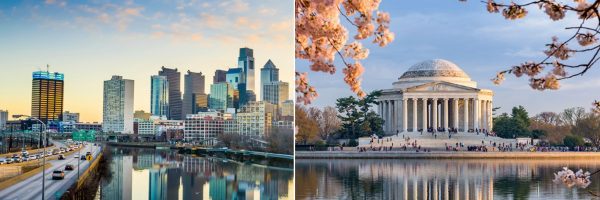
On the surface, cities like Philadelphia and Washington DC appear to have a lot in common. Both have occupied roles as a center of U.S. history, and have transformed into exciting and ever-changing metros for both established businesses and new startups. If you’re interested in earning an MBA in a top metro area on the East Coast, it might seem impossible to choose between the two.
Even so, Philadelphia and DC offer a number of exciting—but different—kinds of opportunities for up-and-coming business professionals. Between what program you want to pursue and what kind of career you envision yourself in down the line, understanding the differences between top metros can be a crucial part of planning your future. Below, we’ll break down some of the biggest differences in location, programs, and job placement for each metro.
Philadelphia vs. Washington DC: The Differences
For ambitious business students hoping to put their education to work in a government agency, it’ll be hard to beat the nation’s capital for opportunities and experience. Even for those looking outside of the government setting, the DC metro area is home to fifteen companies on the Fortune 500 list, including corporate giants like Exxon Mobile and Walmart. Yet while such heavy hitting companies in the area provide a high earning potential, MBAs will still want to consider the high price of living in DC: currently, the city ranks as the third most expensive place to live in the country.
Check This Out: Searching for the World’s Top MBA Recruiters: Comcast
While Philadelphia may not be the city that pops into your mind as a bustling center of business, research shows the City of Brotherly Love can’t be beat when considering the job market and affordability: a 2016 survey from Adobo found that Philadelphia’s unemployment rate was 20 basis points below the national average, while the average price of a home was at or below 30 percent of the average income. MBA graduates will find no shortage of business opportunities in the city, even among major firms: in 2017, 20 companies in the Philadelphia metro made the Fortune 500 list.
Washington DC’s Full-Time MBA Programs
Featuring more than 35 higher education institutions with post-bachelor business programs, Washington DC is home to some of the top MBA programs in the United States. Fully aware that many of these programs will shape future politicians and government leaders, many of the MBA programs in Washington DC include a focus on integrity and ethics within the global business community.
Full-Time MBA Programs in DC Include:
- George Mason University School of Business
- George Washington University School of Business
- Kogod School of Business – American University
- University of Maryland R.H. Smith School of Business
- McDonough School of Business – Georgetown University
Philadelphia’s Full-Time MBA Programs
When it comes to business schools, Philadelphia is probably best known for The Wharton School at the University of Pennsylvania, consistently named as one of the top business programs in the world. But Philly is also home to a wide range of programs with a variety of specializations. Programs like the full-time MBA at Temple University’s Fox School of Business also offer students to take their education beyond Philadelphia, with international campuses based in Italy, London, and Japan.
Full-Time MBA Programs in Philadelphia Include:
- La Salle University
- LeBow College of Business – Drexel University
- Villanova School of Business
- West Chester University
Cost of MBA Programs
Just as important a factor as cost of living, average cost for an MBA program is an important consideration when choosing where to earn your degree. As expected, top programs in both Philadelphia and Washington DC can come with a high price tag. The average cost estimate for one year at Wharton is $105,265, while tuition at DC’s Georgetown McDonough School of Business is $90,591. The average for each city, however, remains much for affordable: approximately $82,090 for programs in Washington DC, and slightly lower in Philadelphia—schools like West Chester even offer an MBA as low as $21,000 per year.
Job Placement and Salary
With so many incredible companies located in both Washington DC and Philadelphia, MBAs have the chance to earn top salaries that can go a long way in both cities. Depending on the position, MBAs in Philadelphia can make anywhere from $64,665 per year (as a financial analyst) to $104,186 per year (as a senior product manager). In Washington DC, the average salary for an MBA graduate is in the $80,000 range, with employees reporting yearly salaries of $74,758 (operations manager) up to $111,983 (marketing director).
Chicago Booth Professor Anil Kashyap Honored By Japanese Government
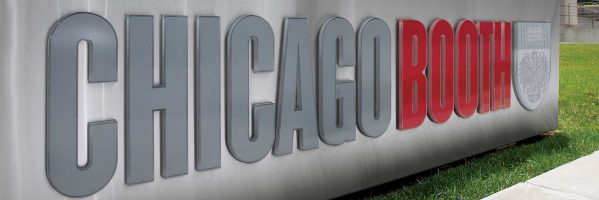
Last month, University of Chicago Booth School of Business professor Anil Kashyap received the Order of the Rising Sun, Gold Rays with Neck Ribbon award by the Japanese government. This prestigious award honors the renowned economist’s distinguished achievements and contributions to Japan.
Kashyap was honored for the significant role he played in promoting and disseminating high quality research on the Japanese financial system and economic policies. According to the school, he coordinated conferences bringing together Japanese and American researchers in partnership with the Economic and Social Research Institute, the think-tank under the Cabinet Office of Japan.
“It has been an honor and a privilege to work with the Cabinet office on these conferences. They have generated many good research papers, forged some collaborations and hopefully have helped with the policy process,” Kashyap said after receiving the award.
The Order of the Rising Sun was originally established in 1875 by Japanese Emperor Meiji as the first national decoration awarded by the Japanese government. However, a modern version has been awarded to non-Japanese recipients since 1981.
Today the award honors individuals who have made significant contributions to international relations, promotion of Japanese culture, advancements in their field, development in welfare, as well as preservation of the environment. Kashyap was among 149 foreign recipients of the award this year.
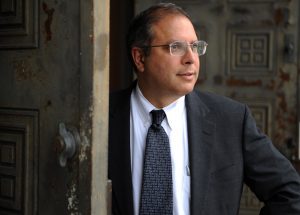
Anil Kashyap/Photo via Chicago Booth
Prior to joining the Chicago Booth faculty in 1991, Kashyap spent three years as an economist for the Board of Governors for the Federal Reserve System. In addition to his exploits in Japan, he is on the Board of Directors of the Bank of Italy’s Einuadi Institute of Economics and Finance, is a member of the Squam Lake Group, and serves on the International Monetary Fund’s Advisory Group on the development of a macro-prudential policy framework. Since 2016 he has been an external member of the Bank of England’s Financial Policy Committee.
Kashyap is currently the Edward Eagle Brown Professor of Economics and Finance at Chicago Booth. His research has won him numerous other awards, including a Sloan Research Fellowship, the Nikkei Prize for Excellent Books in Economic Sciences, and a Senior Houblon-Norman Fellowship from the Bank of England.
Kashyap also currently works as a consultant for the Federal Reserve Bank of Chicago, and serves as a member of the Economic Advisory Panel of the Federal Reserve Bank of New York, and as a Research Associate for the National Bureau of Economic Research.
Five Chicago Booth MBAs Named Siebel Scholars, One Named McGowan Fellow
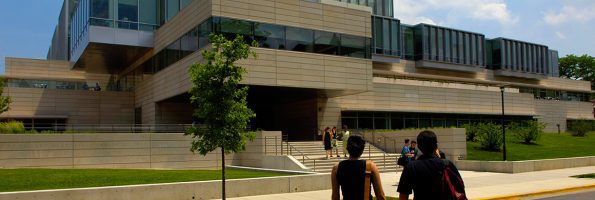
The University of Chicago recently announced it’s Siebel Scholars and McGowan Fellow for 2018, with five MBA students from the Booth School of Business being recognized for their academic achievement and leadership, and awarded scholarship money for their efforts.
Darrick Chan, Kathleen Davis, Monica Kalwani, Igo Shkilko, and Yihan Tan make up this year’s group of Booth Siebel Scholars. Each second-year MBA student received $35,000 each toward their final year of MBA tuition.
Siebel Scholars are nominated their schools deans for their academic excellence, and leadership in the fields of business, computer science, bioengineering, and energy science. Established in 2000, the Siebel Foundation presents grants to more than 90 graduate students from 16 universities in the United States, China, France, Italy, and Japan. On average, Siebel Scholars rank in the top 5 percent of their class, and many rank within the top 1 percent.
Meanwhile, Pedro Amoroso Lima was named Chicago Booth’s McGowan Fellow for 2018 thanks to his commitment to ethical leadership. Lima is one of 10 McGowan Fellows nationwide this year. These students will work together on a social impact project that will tackle a particular challenge.
Established in 2010 by the William G. McGowan Charitable Fund, a Chicago-based family foundation, the McGowan Fellows program awards full-year tuition to select students. The program aims to provide the resources and guidance to young professionals to become ethical, accountable leaders and role models for generations to come.
These are not the only scholarship and fellowship opportunities for Chicago Booth full-time MBAs. Full and partial tuition is awarded through merit-based awards, Chicago Booth Fellowships, and Corporate Fellowships. Merit-based awards do not require a formal application beyond the normal process of applying to Booth.
Like the merit-based awards, the 15 different Chicago Booth Fellowships have no formal application process, although interested Booth applicants are encouraged to contact the Office of Admissions (7773.702.7396) for more information. Fellowships are awarded under the categories of: Academic, Diversity, Industry, Leadership, Military, Regional, and the Yellow Ribbon Program.
Find The Right UCLA Anderson Scholarships And Fellowships
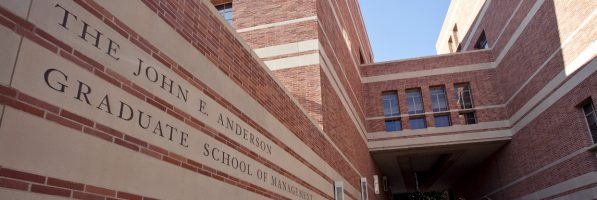
Though earning an MBA is ultimately a fruitful endeavor, the initial cost can leave students tapped out. Luckily, more schools are making an effort to help talented students ease the financial burden of getting a degree, via scholarship support. Many institutions now have a host of resources that counter-balance the intimidating price tag of pursuing an MBA.
Columbia Talks Natural Disasters To Supply Chain

Columbia Business School recently discussed what the far-reaching economic consequences of potential natural disasters can mean for supply chain economics.

